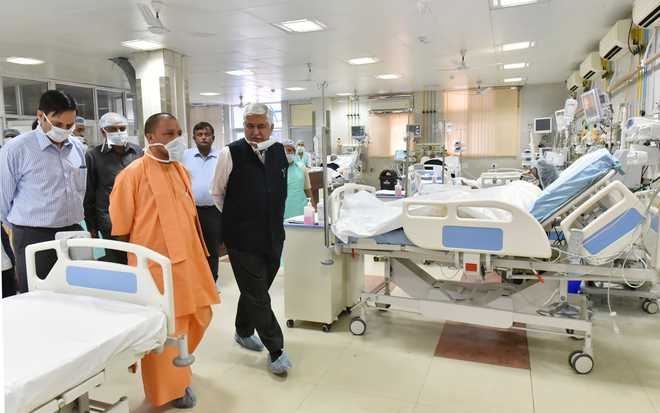The Yogi government is set to ensure that every person in the state has access to healthcare facilities. In its bid to universalize healthcare by 2021, the government has announced to open 500 diagnostic centres across the state. These centres will be set up under public-private partnership (PPP) model, to ensure efficiency and timely delivery of facility. The government will also set up 13 medical colleges in the state, to increase the number of professionals entering in service.
“Encouraging responses have already followed to set up the proposed diagnostic centres from leading hospitals in the private sector and a well-established system is in place to implement setting up of the centres,” said Sidharth Nath Singh, former state health minister of the state. “These centres are basically aimed at providing necessary and essential health services to the people of the state, with an effective pricing mechanism in place in which the weaker and vulnerable would obtain health services with virtually no discrimination,” he added.
Uttar Pradesh has the lowest life expectancy after Assam, and one of the reasons behind this is lack of access to affordable healthcare. As per a report by Observer Research Foundation (ORF), “State statistics however showed inequalities (in life expectancy), with a range of 66.8 years in Uttar Pradesh to 78.7 years in Kerala for females, and from 63.6 years in Assam to 73.8 years in Kerala for males in 2016.”
The previous governments in Uttar Pradesh had a lacklustre attitude towards healthcare, the Mayawati led government did not implemented Rashtriya Swasthya Bima Yojana (RSBY), brought by UPA government, to ensure healthcare for poor and marginalized sections of the society. The healthcare budget of UP has remained dismal under Mayawati and Akhilesh Yadav government.
The Yogi government was the first to prioritize healthcare, on the lines of central government. The average of 27 states on healthcare expenditure is 5.2 percent; Yogi Government allotted 5.4 percent of total spending to healthcare.
Based on inputs National Health Policy, UP government has prepared health policy, to curb the out of pocket health expenditure and boost life expectancy. “We have taken National Health Policy 2017 as base, while our draft policy also incorporates recommendations of WHO about public health policy,” said UP Health System Strengthening Project (UPHSSP) additional project direct Dr Harsh Sharma. “The basic purpose of our policy is to minimise the out of pocket expenditure of patients in the healthcare domain, and it is targetted primarily at the bottom of the pyramid sections of society,” he added.
Previously, in an attempt to universalize healthcare, and curb out of pocket expenditure, Modi government launched Ayushman Bharat scheme on September 23 from Jharkhand. Under the scheme, the Modi government will provide 5 lakh health insurance cover to 50 crore people, which is nearly 40 percent of the population of the country. Besides the insurance cover, the government will create 1, 50,000 wellness centers across the country under the Ayushman Bharat scheme. The families to get benefits of the scheme will be identified from the Socio-Economic and Caste Census (SECC), 2011 data.
According to the draft of the National Health Policy, “Over 63 million people are faced with poverty every year due to healthcare costs alone. It is because there is no financial protection for the vast majority of healthcare needs.” The scheme launched by Modi government is the largest health coverage in the world. In total, thirty-one states and union territories have agreed to implement the Ayushman Bharat scheme.
